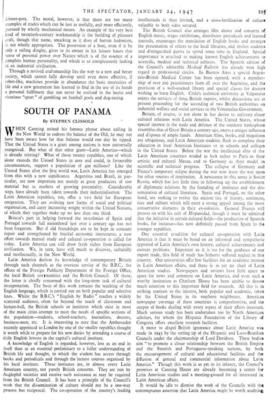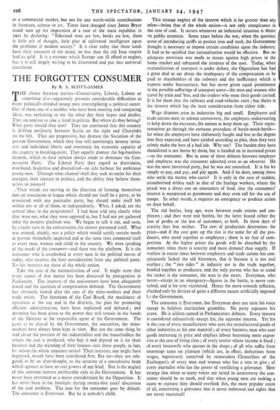SOUTH OF PANAMA
By STEPHEN CLISSOLD
WHEN Canning coined his famous phrase about calling in the New World to redress the balance of •the Old, he may not have been aware how far that balance would one day be tipped. That the United States is a giant among nations is now universally recognised. But what of that other giant—Latin America—which is already stirring? What of those twenty republics, one of which alone exceeds the United States in area and could, in favourable circumstances, support a population of 40o millions? Like the United States after the first world war, Latin America has emerged from this with a new significance. Argentina and Brazil, in par- ticular, are now important not merely as great producers of raw material 'but as markets of growing potentiality. Considerable steps have already been taken towards their industrialisation. The Latin American republics, too, offer a vast field for European emigration. They are evolving new forms of social and political organisation, and carry increasing weight within the United Nations, of which they together make up no less than one third.
Britain's part in helping forward the ex-colonies of Spain and Portugal towards full nationhood just over a century ago has not been forgotten. But if old friendships are to be kept in constant repair and strengthened by fruitful economic intercourse, a new effort towards mutual study and cultural co-operation is called for today. Latin America can still draw fresh riches from European civilisation. We, in turn, have still much to discover, culturally and intellectually, in the New World.
Latin America derives its knowledge of contemporary Britain through such channels as the overseas service of the B.B.C., the offices of the Foreign Publicity Department of the Foreign Office, the local British coninunities and the British Council. Of these, the latter is chiefly concerned with the long-term task of cultural interpretation. The basis of this work remains the teaching of the English language, which is carried out on both popular and selective lines. Whilst the B.B.C.'s " English by Radio reaches a widely scattered audience, often far beyond the reach of classroom and lecture-hall, the British schools or institutes which exist in most of the main cities attempt to meet the needs of specific sections of the population—students, school-teachers, journalists, doctors, business-men, etc. It is interesting to note that the Ambassador recently appointed to London by one of the smaller republics thought it worth while to prepare for his new duties by attending a course of daily English lessons in the capital's cultural institute.
A knowledge of English is regarded, however, less as an end in itself than as an essential preliminary to a fuller understanding of British life and thought, to which the student has access through books and periodicals and through the lecture courses organised by his local institute. These institutes are, in almost every Latin American country, not purely British concerns. They are run by Anglophil societies and receive such assistance as may be required from the British Council. It has been a principle of the Council's work that the dissemination of culture should not be a one-way process but reciprocal. The co-operation of the country's leading intellectuals is thus invited, and a cross-fertilisation of culture valuable to both sides secured.
The British Council also arranges film shows and concerts oil English music, stages exhibitions, distributes periodicals and learned journals, encourages the translation of English books and arranges the presentation of others to the local libraries, and invites students and distinguished guests to spend some time in England. Special importance is attached to making known English achievements in scientific, medical and technical subjects. The Spanish edition of the Council's admirable Medical Bulletin has already won high regard in professional circles. In Buenos Aires a special Argen- tine-British Medical Centre has been opened, with a member- ship of over zoo practitioners from all over the Argentine, and the provision of a well-stocked library and special classes for doctors wishing to learn English. Chile's technical university at Valparaiso enjoys the services of three British experts, whilst discussions are at present proceeding for the seconding of two British authorities on industrial welfare and social services to the Venezuelan Government.
Britain, of course, is not alone in her desire to cultivate closer cultural relations with Latin America. The United States, whose special interest in the trade and defence of the southern hemisphere resembles that of Great Britain a century ago, exerts a unique influence and disposes of ample funds. American films, books, and magazines are ubiquitous, and Latin American students flock to complete their education in local American Institutes or in schools and colleges in the United States. Before the war the intellectual elite of the Latin American countries tended to lock rather to Paris as their artistic and cultural Mecca, and to Germany as their model in scientific and technical progress. The collapse of Germany and France's temporary eclipse during the war now leave the way open for other sources of inspiration. A newcomer in this sense is Soviet Russia, which has lost little time in following up the establishment of diplomatic relations by the founding of institutes and the dis- semination of cultural literature. Spain and Portugal, on the other hand, are seeking to revive the ancient ties of history, sentiment, race and culture which still exert a strong appeal among the more conservative elements in their ex-colonies. General Franco still presses on with his cult of Hispanidad, though it must be admitted that the initiative in certain cultural fields—the production of Spanish books, for instance—has now definitely passed from Spain to the younger republics.
One essential condition for cultural co-operation with Latin America is that it must be based on an informed and sympathetic appraisal of Latin America's own history, cultural achievements and current problems. Important as it is too for the guidance of our export trade, this field of study has hitherto suffered neglect in this country. Our universities offer few facilities for an academic interest in Latin American affairs, and there is as yet no chair of Latin American studies. Newspapers and reviews have little space to spare for news and comment on Latin America, and even such a worthy institution as Chatham House has been unable to devote much attention to this important field for research. All this is in striking contrast to the interest, both popular and academic, taken by the United States in its southern neighbours. American newspaper coverage of these countries is comprehensive, and the output of books dealing with every aspect of their affairs incessant. Much serious study has been undertaken too by North American scholars, for whom the Hispanic Foundation of the Library of Congress offers excellent research facilities.
A move to dispel British ignorance about Latin America was made in 1943 by the setting up of the Hispanic and Luso-Brazilian Councils under the chairmanship of Lord Davidson. These bodies aim " to promote a closer relationship between the British Empire and the Spanish and Portuguese-speaking nations, by both the encouragement of cultural and educational facilities and the diffusion of general and commercial information about Latin America." Though this work.is as yet in its infancy, the Council's premises at Canning House are already becoming a centre for Latin American studies and a meeting-ground for all interested in Latin American affairs.
It would be idle to dismiss the work of the Councils with thl contemptuous assertion that Latin America might be worth studyinj
as a commercial market, but not for any worth-while contributions in literature, science or art. Times have changed since James Bryce could sum up his impression of a tour of the main republics in 1911 by declaring : " Educated men are few, books are few, there is little stir of thought, little play of cultivated intelligence upon the problems of modern society." It is clear today that these lands have their treasures of the mind, no less than the old Inca empire had its gold. It is a treasure which Europe can ill afford to neglect, but it is still largely walling to be discovered and put into universal circulation.



































 Previous page
Previous page